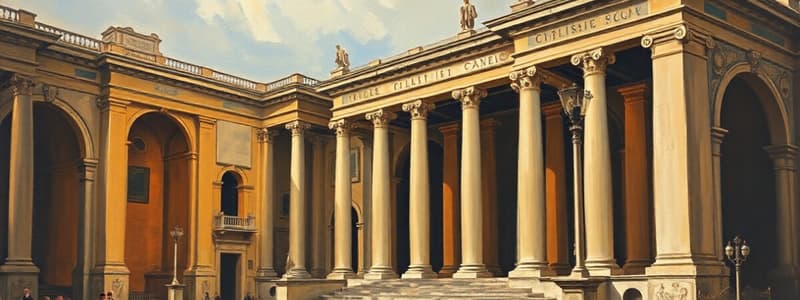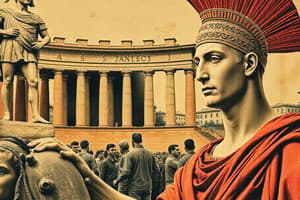Podcast
Questions and Answers
What title did Augustus accept in 27 BC that signified his potential to increase Rome's prosperity?
What title did Augustus accept in 27 BC that signified his potential to increase Rome's prosperity?
- Princeps
- Caesar
- Imperator
- Augustus (correct)
Which of the following powers granted Augustus veto power over legislation?
Which of the following powers granted Augustus veto power over legislation?
- Potestas
- Auctoritas
- Tribunicia potestas (correct)
- Imperium
How did Augustus position himself in relation to ordinary politicians?
How did Augustus position himself in relation to ordinary politicians?
- As a mere advisor
- As a figure above them (correct)
- As an equal
- As an opponent
What does the term 'principate' refer to in Augustus's political system?
What does the term 'principate' refer to in Augustus's political system?
Which of the following aspects contributed significantly to Augustus's legitimacy?
Which of the following aspects contributed significantly to Augustus's legitimacy?
What was the primary objective of Augustus's political strategy?
What was the primary objective of Augustus's political strategy?
Which title did Augustus want to be associated with through the deification of Julius Caesar?
Which title did Augustus want to be associated with through the deification of Julius Caesar?
What did 'Imperium' signify in Augustus's rise to power?
What did 'Imperium' signify in Augustus's rise to power?
Flashcards
The Title of Augustus
The Title of Augustus
The title "Augustus" was given to Octavian in 27 BC, signifying his position as the first Roman Emperor. It was derived from the Latin verb "augere" (to increase), implying his ability to enhance Rome's prosperity. It also carried religious connotations, linking him to the deified Julius Caesar, who was known as "Divus Iulius" after his death.
Augustus's Power Combination
Augustus's Power Combination
Augustus's role combined "Imperium" (military power) and "potestas" (civil power). He also held the "tribunicia potestas," granting him veto power over legislation and personal immunity, similar to Roman tribunes. This power combination placed him above other political figures.
Augustus's Moral Authority
Augustus's Moral Authority
Augustus wielded "auctoritas" (moral authority) which went beyond legal power, adding to his legitimacy. He positioned himself as a figure above ordinary politicians. This moral authority was crucial in his consolidation of power, as it enabled him to gain respect and loyalty from the Romans.
The Principate
The Principate
Signup and view all the flashcards
Augustus's Political Skill
Augustus's Political Skill
Signup and view all the flashcards
The Symbolism of "Augustus"
The Symbolism of "Augustus"
Signup and view all the flashcards
The "Tribunicia Potestas"
The "Tribunicia Potestas"
Signup and view all the flashcards
Augustus's "Principate"
Augustus's "Principate"
Signup and view all the flashcards





